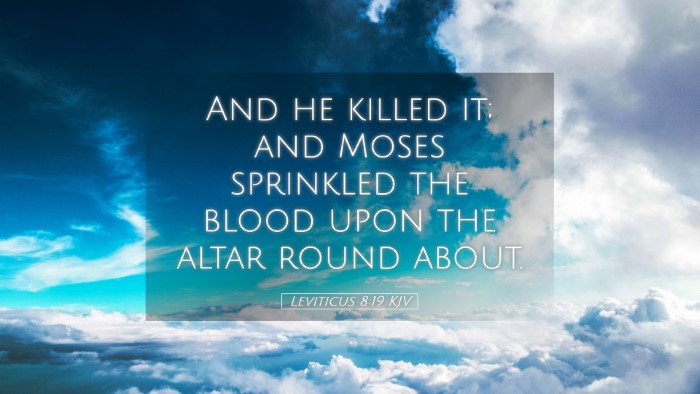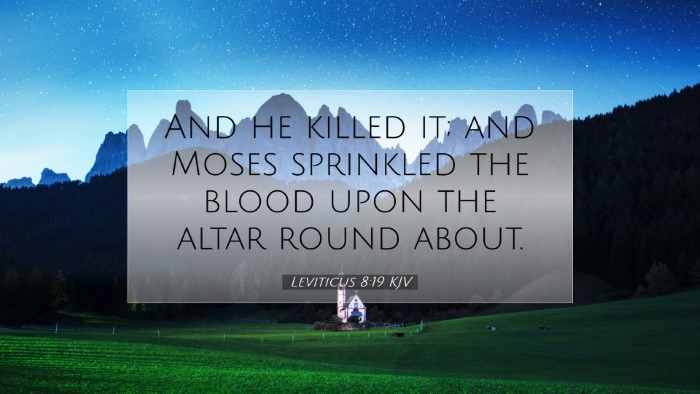Commentary on Leviticus 8:19
Bible Verse: Leviticus 8:19 - "And he killed it; and Moses sprinkled the blood upon the altar round about."
Introduction
The book of Leviticus serves as a critical text in understanding the holiness and sacrificial system of ancient Israel. Leviticus 8 marks the consecration of Aaron and his sons as priests, establishing their role in mediating between God and the people. Verse 19, mentioning the killing and sprinkling of blood, holds deep theological significance. This commentary synthesizes insights from renowned public domain sources, offering a holistic view aimed at pastors, students, theologians, and Bible scholars.
Theological Significance
The act of killing the sacrifice and sprinkling its blood is foundational to the atonement rituals in the Old Testament. Matthew Henry notes that blood signifies life and its sprinkling denotes atonement. In ancient Israel, blood was the means through which atonement was made, as it represents the cost of sin and the seriousness of the covenantal relationship with God.
Matthew Henry's Perspective
Matthew Henry emphasizes the gravity of the sacrificial practice. The slaying of the sacrifice indicates the necessity of a substitute to bear the penalty for sin. He observes that the blood was not merely a ritualistic element but a vital component expressing the principle that without the shedding of blood, there is no remission of sins (Hebrews 9:22). This act foreshadows the ultimate sacrifice of Christ, where His blood would be shed once for all, providing complete atonement for humanity.
Albert Barnes' Insights
Albert Barnes elaborates on the significance of the altar and the blood in sacrificial rites. He highlights that the altar is a representation of God's presence among His people. The sprinkling of blood around the altar symbolizes the covering of the sins of the people and the establishment of a holy communion between God and the priests. Barnes also provides a contextual understanding of Leviticus 8:19 within the framework of the priestly ordinances, indicating that these practices are vital in maintaining holiness before God.
Adam Clarke's Interpretation
Adam Clarke delves into the concept of the 'blood of the covenant.' He sees the act of sprinkling blood as a reaffirmation of the covenant between God and Israel. This reflects God's grace, allowing the Israelites to approach Him despite their sinfulness, provided they follow the sacrificial system's regulations. Clarke notes that this act would become a prototype, illuminating the New Testament's teachings about Christ's sacrificial death and the new covenant in His blood.
Covenantal Context
The sprinkling of blood in Leviticus 8:19 takes place at a moment of immense importance in Israel's history. This act is part of the consecration ceremony for Aaron and his sons, who are being established as the mediators between God and the people. The seriousness with which this act is performed speaks volumes about the holiness required when approaching God. The commentators agree that the ritual is not arbitrary but profoundly rooted in the covenantal relationship between God and Israel, established on the basis of sacrifice.
Lessons for Today
As pastors and theologians reflect on Leviticus 8:19, several vital lessons emerge:
- The Importance of Holiness: The meticulous nature of the sacrificial system reminds contemporary believers of God’s holiness and the seriousness of sin.
- Understanding Atonement: The act of sprinkling blood symbolizes the atonement of sins, a theme that culminates in the New Testament with Christ’s sacrifice.
- Covenant Renewal: The blood symbolizes the covenant, encouraging believers today to remember and renew their covenant relationship with God through Christ.
Conclusion
Leviticus 8:19 serves as a powerful reminder of the foundational elements of sacrificial worship in ancient Israel and its theological implications for believers today. The acts of killing the sacrifice and sprinkling of blood illustrate the seriousness of sin and the need for atonement. Through the insights gained from Matthew Henry, Albert Barnes, and Adam Clarke, we can appreciate the depth of this scripture and its fulfillment in the New Testament, leading to profound reflections on our faith and relationship with God.


